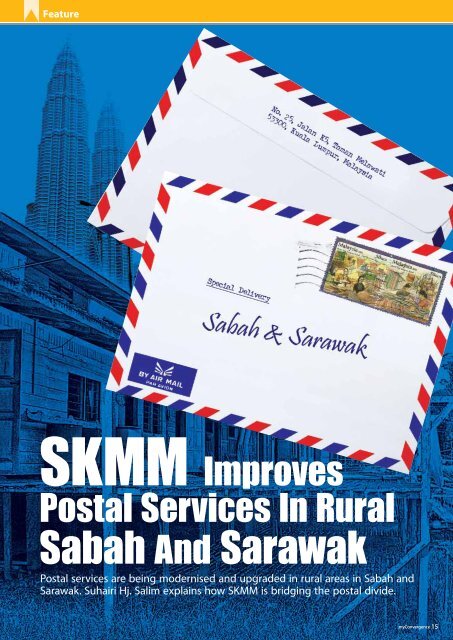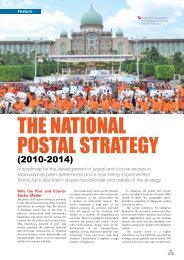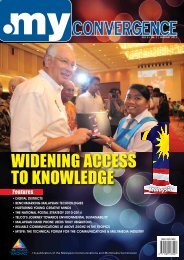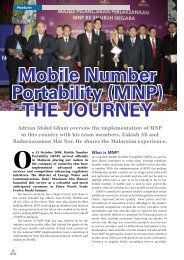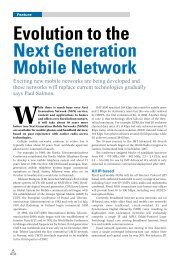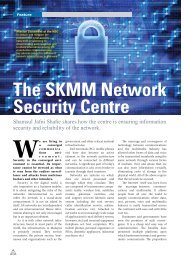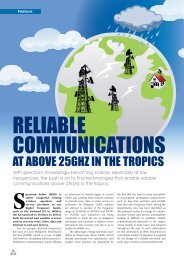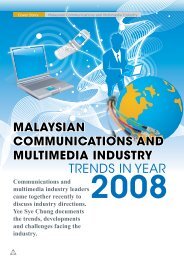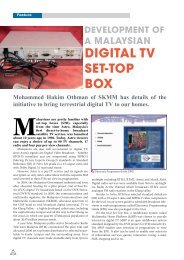Sabah And Sarawak - my Convergence Magazine
Sabah And Sarawak - my Convergence Magazine
Sabah And Sarawak - my Convergence Magazine
You also want an ePaper? Increase the reach of your titles
YUMPU automatically turns print PDFs into web optimized ePapers that Google loves.
Feature<br />
SKMM Improves<br />
Postal Services In Rural<br />
<strong>Sabah</strong> <strong>And</strong> <strong>Sarawak</strong><br />
Postal services are being modernised and upgraded in rural areas in <strong>Sabah</strong> and<br />
<strong>Sarawak</strong>. Suhairi Hj. Salim explains how SKMM is bridging the postal divide.<br />
.<strong>my</strong><strong>Convergence</strong> 15
Launching of Postal Transformation Plan in <strong>Sabah</strong> and<br />
<strong>Sarawak</strong> by YB Dato’ Seri Utama Dr. Rais Yatim, Minister<br />
of Information, Communications and Culture<br />
Residents of Pulau Banggi<br />
in <strong>Sabah</strong> can now count<br />
on Rupiah Ghafur, a newly<br />
appointed Posmen Komuniti<br />
(PK or community postman) to<br />
deliver their mail directly to their homes.<br />
The 30-year-old woman from the island’s<br />
main town of Karakit is one of two people<br />
appointed by Pos Malaysia to deliver mail<br />
in Pulau Banggi. Pulau Banggi is located<br />
on the northern tip off the coast of <strong>Sabah</strong>.<br />
Pos Malaysia sends mail addressed to the<br />
residents of that island to Rupiah, using the<br />
daily ferry service from Kudat, about 35km<br />
away or 90 minutes by ferry. "Once I get the<br />
mail, I distribute it to the homes or postal<br />
representatives on the island. This is a big<br />
responsibility for me because the island is<br />
large and there are a lot of people here,"<br />
she said of the island with a population of<br />
20,000 and 50 villages.<br />
Pulau Banggi is the largest island<br />
in Malaysia. Before the introduction of<br />
PKs, the islanders had to rent postal<br />
boxes (P.O. Box) at the nearest post<br />
office in Kudat town on the mainland.<br />
The journey to the mainland is an hour’s<br />
boat ride away and boat travel is often<br />
unavailable in rough weather conditions<br />
in the South China Sea and Sulu Sea.<br />
When someone from the island was<br />
expecting an important letter, such as a<br />
job appointment or college acceptance<br />
letter, he would have to go through such<br />
hassles just to check the postal box every<br />
day. Not checking it could mean the loss<br />
of a once in a life time golden opportunity.<br />
Valuable time, money and energy were<br />
being wasted.<br />
Farmer David Lingki, when not tending<br />
to his 12sq km paddy field, ensures mail<br />
reaches hundreds of people in his native<br />
northern <strong>Sabah</strong> district of Kota Marudu.<br />
The 54-year-old father of five drives 10 km<br />
to Kota Marudu town in his Perodua Rusa<br />
van to collect letters and other mails meant<br />
for villagers staying in about 10 settlements<br />
near his home of Kampung Ganai. “I know<br />
they appreciate the mail being sent to them<br />
because it is quite difficult for some of them<br />
to go to the post office in town,” said Lingki.<br />
The appointments of Posmen Komuniti<br />
like Rupiah and David Lingkid are part of<br />
the Postal Service Transformation Plan<br />
introduced by SKMM to improve postal<br />
services in <strong>Sabah</strong> and <strong>Sarawak</strong>.<br />
Rural Postal Service Study<br />
by SKMM<br />
Three years ago, SKMM formed a special<br />
project group to study the rural postal<br />
service in Malaysia. The main objectives<br />
were to develop a rural postal policy and<br />
to prepare a development plan that will<br />
improve the level of mail delivery service<br />
and access to postal outlets in rural areas.<br />
The project team visited several rural<br />
post offices, including that in a small<br />
township known as Long Lama in <strong>Sarawak</strong>.<br />
The journey took eight hours of a bumpy<br />
boat ride negotiating the Baram River,<br />
locally known as Batang Baram. This river<br />
is the second longest river in <strong>Sarawak</strong> and<br />
cuts through the thick Borneo’s rainforest.<br />
The town has no other proper save access<br />
except the rugged logging dirt road which<br />
is inaccessible during heavy rain and which<br />
is also flood prone.<br />
Postal “last-mile” dialogues with<br />
postmen were also held at Kota Kinabalu,<br />
Kuching and Miri chaired by YB Dato’ Joseph<br />
Salang, Deputy Minister of the Ministry of<br />
Information, Communications and Culture.<br />
The team wanted to understand the rural<br />
postal service issues before formulating<br />
practical solutions for the people.<br />
The Malaysian rural postal service<br />
provisioning in <strong>Sabah</strong> and <strong>Sarawak</strong> is<br />
exceptionally challenging due to several<br />
factors. Firstly, a quality addressing system<br />
is substantially lacking. It is burdened and<br />
hampered by enormously challenging<br />
geographical terrains, wide population<br />
dispersions and extremely remote locations.<br />
The cost of rural service provisioning<br />
is also very high and without the help of<br />
the government, difficult to establish and<br />
sustain. Furthermore, most rural post offices<br />
are operating at a loss due to inadequate<br />
numbers of counter transactions, thwarting<br />
the expansion and establishment of new<br />
full-fledge post offices in rural areas, even<br />
for a one-man counter.<br />
Rural Pos Mini entrepreneur module<br />
operators (Mini Post outlets) are also<br />
struggling, barely making a minimal profit<br />
per month. The only way pos mini operators<br />
have been able to continue serving the<br />
public is by making their postal operations<br />
a secondary business, in addition to their<br />
existing businesses such as sundry or<br />
stationery shops.<br />
A new formula was inevitable to<br />
address the postal exclusion issue in <strong>Sabah</strong><br />
Delivering to<br />
the doorsteps<br />
16 .<strong>my</strong><strong>Convergence</strong>
Reaching out to the<br />
rural community<br />
and <strong>Sarawak</strong>, and it required immediate<br />
attention by the Government and SKMM.<br />
Postal Transformation Plan<br />
in <strong>Sabah</strong> and <strong>Sarawak</strong><br />
The provision of sustainable universal<br />
postal service is a complex issue and<br />
central in the postal policy discussion<br />
worldwide. In the Malaysian context,<br />
Pos Malaysia has been entrusted to<br />
carry out the obligation of providing the<br />
postal service universally without undue<br />
discrimination, irrespective if a person<br />
is living in a town or in a rural area as<br />
stipulated in its licence conditions.<br />
In the light of mail volume decline<br />
and increase in population and delivery<br />
points, the burden of providing the postal<br />
service in rural areas in particular has<br />
become an issue to be addressed by the<br />
policy maker. The new postal legislation is<br />
intended to provide a solution to this issue<br />
by introducing multiple approaches such<br />
as postal fund, reserve service, and a new<br />
tariff regime.<br />
13 May 2010 was a historical date for<br />
the rural postal service in Malaysia when YB<br />
Dato’ Seri Utama Dr. Rais Yatim, Minister of<br />
Information, Communications and Culture<br />
launched the Postal Transformation Plan<br />
(PTPSS) in <strong>Sabah</strong> and <strong>Sarawak</strong> in Sibu,<br />
<strong>Sarawak</strong>.<br />
PTPSS will be jointly funded by<br />
SKMM and Pos Malaysia. SKMM<br />
allocated RM10 million to support the<br />
implementation of PTPSS, and Pos Malaysia<br />
will absorb operational cost including<br />
logistics, uniforms, identification, signage,<br />
awareness campaigns and training. This two<br />
years public private initiative programme<br />
is consistent with the objectives set by<br />
the National Postal Strategy to achieve<br />
home mail delivery service level of<br />
95 percent and 15,000 people per postal<br />
outlet by 2014.<br />
The PTPSS initiative was engineered<br />
to help achieve SKMM's and national<br />
aspirations of improving home mail<br />
delivery and access to basic postal service<br />
in rural areas. The New Economic Model<br />
aims to ensure an inclusive socio-economic<br />
development for the rakyat in rural parts<br />
of <strong>Sabah</strong> and <strong>Sarawak</strong>.<br />
Under the programme, Pos Malaysia<br />
will appoint 400 Posmen Komuniti, 1,000<br />
Wakil Pos Komuniti (WPK) community<br />
postal representatives and 10 mobile post<br />
offices.<br />
Posmen Komuniti<br />
PTPSS targeted to appoint 400 PK, 200<br />
in <strong>Sabah</strong> and 200 in <strong>Sarawak</strong>. They are<br />
paid a maximum of RM500 allowance<br />
based on the distance from the nearest<br />
post office and the size of mail delivery<br />
area coverage. The prerequisite of this<br />
programme is that the appointed PK must<br />
be a local residing in the village to ensure<br />
that the mails are delivered efficiently,<br />
easily and safely.<br />
Posmen Komuniti<br />
delivering mail at one<br />
of the Longhouses<br />
The houses in the vicinity are usually<br />
without complete addresses and very<br />
remote. Mails cannot be delivered by<br />
conventional postmen. By being a local<br />
resident, the PK is able to identify the<br />
delivery point or the recipients’ house to<br />
deliver their mail. This concept is similar to<br />
the normal postmen in a small town who<br />
are able to identify the dwellers, including<br />
their children’s names, after years of<br />
experience serving the place.<br />
A PK usually already makes trips to the<br />
nearest town to run errands like paying<br />
bills, buying or replenishing groceries<br />
and household needs. Since the PK is<br />
required to go to the nearest post office<br />
two or three times a week to collect the<br />
mail, this is easily handled during their<br />
regular trips. The monthly allowance<br />
provided becomes the incentive for the<br />
PK to collect and deliver mail to recipients<br />
consistently.<br />
In addition, a PK who possesses some<br />
amount of basic entrepreneur savvy can<br />
buy products from the town and supply<br />
.<strong>my</strong><strong>Convergence</strong> 17
Logo<br />
Posmen Komuniti Identifications<br />
Uniform<br />
Identification card<br />
Such great flexibility enables one<br />
PoW to be considered to be equal to five<br />
postal outlets. A PoW is able to reach out<br />
where other amenities like banks cannot<br />
operate. In rural areas where there is<br />
no banking facility, the community will<br />
often turn to the Permodalan Nasional<br />
(PNB) unit trust agency services provided<br />
by Pos Malaysia. The unit trust options<br />
become similar to banking functions<br />
to them. 10 PoWs are planned to be<br />
actively operational by 2012. 4 PoWs<br />
are currently fully operating and the<br />
number of patrons is growing fast as the<br />
service gains popularity. The remaining<br />
6 PoWs are expected to be running by<br />
September 2011. Grueling journeys to<br />
the town just to patronize a post office<br />
will be something in the past for some<br />
fortunate rural villagers, thanks to these<br />
mobile post offices equipped with online<br />
access capabilities.<br />
Buntings<br />
Booths<br />
them to the villagers. This will supplement<br />
his income and travelling cost. Eventually<br />
a PK might end up becoming the most<br />
popular person in the village. As of<br />
April 2011, all 400 PK have already been<br />
appointed by Pos Malaysia.<br />
Wakil Pos Komuniti (WPK)<br />
The PTPSS aimed to appoint 1,000 WPK,<br />
equally divided between <strong>Sabah</strong> and<br />
<strong>Sarawak</strong>. A WPK receives an allowance<br />
of RM50 a month. Unlike the Posmen<br />
Komuniti, a Wakil Pos Komuniti does not<br />
deliver or collect mail from the post office.<br />
Instead his main function is as a drop-offpoint<br />
and caretaker for the mail.<br />
The PK will deliver mails to the WPK’s<br />
premises, either to their house, sundry shop<br />
or food stall. The villagers or the rumah<br />
panjang (long house) dwellers on the other<br />
hand, will then visit WPK to check if they<br />
have mail or not. They can do this almost<br />
every day since the WPKs live very near to<br />
them or in the same longhouse.<br />
The WPK will ensure that the mails are<br />
safely kept and not tampered with. Some<br />
WPKs have also, entirely voluntarily, taken<br />
the additional initiative of delivering mail to<br />
recipients at no additional cost. Not only are<br />
they proud to be appointed and entrusted<br />
as a WPK, they are voluntarily delivering<br />
mail because they realise that they are<br />
contributing to the wellbeing, interests and<br />
benefits of their own community. 575 WPK<br />
have been appointed so far.<br />
Light box signage<br />
Vehicle identification<br />
Pos-on-Wheels<br />
The Pos-on-Wheels (PoW) is a mobile post<br />
office. The specially modified vehicles<br />
are equipped with VSAT capability at the<br />
service cost of RM70,000 a year. VSAT is a<br />
two-way satellite to ground service that<br />
enables a PoW to conduct online services.<br />
A PoW provides all the postal and agency<br />
service transactions similar to that of a<br />
regular post office’s counter. A PoW will<br />
frequent at least 5 rural locations in a<br />
week. PoWs are stationed at the district<br />
post offices and travel to pre-determined<br />
locations to offer their services.<br />
Pos-on-Wheels ready to roll<br />
Positive Response from<br />
Citizens<br />
Thousand of hearts have been touched<br />
by the PTPSS. One of the villagers in<br />
Pulau Banggi, a retired ar<strong>my</strong> man,<br />
related his heartfelt appreciation when<br />
he received his first mail delivered at his<br />
home. It was just a normal bulletin from<br />
the Defense Ministry, received after years<br />
of leaving the corps. But the touchpoint<br />
impact was huge. Just by receiving that<br />
bulletin, he felt that the precious years<br />
of his life spent guarding our nation<br />
were appreciated. He felt that he was<br />
remembered.<br />
Thanks to the many innovative<br />
initiatives launched under the publicprivate<br />
partnership PTPSS, the goal of<br />
quality postal service inclusion in rural<br />
<strong>Sabah</strong> and <strong>Sarawak</strong> has taken a major<br />
step closer to reality.<br />
18 .<strong>my</strong><strong>Convergence</strong>
Table 1: PTPSS development status as at April 2011 by state<br />
SABAH<br />
SARAWAK<br />
Target Completed Target Completed<br />
POSMEN KOMUNITI 200 200 200 200<br />
WAKIL POS KOMUNITI 500 279 500 296<br />
POS-ON-WHEELS (PoW) 5 2 5 2<br />
Table 2: Numbers and coverage of operating PoWs since March 2011<br />
SABAH<br />
Base<br />
Service Points<br />
Base<br />
Kota<br />
Kinabalu<br />
1. Kg. Moyog<br />
2. Pekan Kawang<br />
3. Kimanis<br />
4. Sabindo<br />
5. Bangunan Konsulat Indonesia<br />
6. Pangkalan TLDM, Sepanggar<br />
7. Grand Millennium, Penampang<br />
SARAWAK<br />
Service Points<br />
Kuching A 1. Sematan<br />
2. Gedung, Serian<br />
3. Balai Ringin, Serian<br />
4. Kg. Santubong<br />
5. Kg. Muara Tebas<br />
Sandakan 1. Sibunga Jaya<br />
2. Batu 16<br />
3. Taman Fajar<br />
4. Batu 32<br />
5. Batu Sapi<br />
6. Bandar Indah<br />
7. Pekan Sukau<br />
8. Batu Putih<br />
Sibu<br />
1. Selangau<br />
2. Stapang<br />
3. Sekuau<br />
4. Durin Bazaar<br />
5. Bawang Assan<br />
6. Sungai Sadit<br />
7. Penasu<br />
8. Rantau Panjang<br />
9. Pasai Siong<br />
Table 3: Coverage of PoWs expected to be operational by September 2011<br />
Base<br />
SABAH<br />
Tawau 1. Kalabakan<br />
2. Merotai<br />
3. Umas-Umas<br />
4. Balung<br />
5. Semporna<br />
Service Points<br />
Base<br />
SARAWAK<br />
Service Points<br />
Kuching B 1. Sadong Jaya<br />
2. Kg. Tun Razak and Balai Ringin<br />
3. Penjara Pusat<br />
4. Kg. Annah Rais<br />
Lahad Datu 1. Jericco<br />
2. Silam<br />
3. Sepagaya<br />
4. Kg. Panji<br />
5. Pekan Tangku<br />
Beaufort 1. Sindumin<br />
2. Weston<br />
3. Batu<br />
4. Kota Kilas<br />
5. Kerukan<br />
Sri Aman 1. Pekan Lachau<br />
2. Kg. Batu Lintang<br />
3. Taman Seri Jaya<br />
4. Kg. Beladin<br />
Miri 1. Luak Bay<br />
2. Kg. Bakam<br />
3. Bakong<br />
4. Simpang Bekenu<br />
5. Simpang Batu Niah<br />
Items delivered by posmen komuniti from January to May 2011<br />
Others<br />
12%<br />
Others<br />
12%<br />
Letter & Cards<br />
87%<br />
Letter & Cards<br />
87%<br />
From January to May 2011, a total<br />
of 700,000 items were delivered by<br />
posmen komuniti to the rural folks in<br />
<strong>Sabah</strong> and <strong>Sarawak</strong><br />
Letter & Cards (87%)<br />
Others (12%)<br />
Registered Post (1%)<br />
Parcels (0%)<br />
PosLaju (0%)<br />
Express Post (0%)<br />
Letter & Cards (87%)<br />
Others (12%)<br />
Registered Post (1%)<br />
Parcels (0%)<br />
PosLaju (0%)<br />
Express Post (0%)<br />
Suhairi Hj. Salim<br />
can be contacted at<br />
suhairi.salim@cmc.gov.<strong>my</strong><br />
.<strong>my</strong><strong>Convergence</strong> 19


